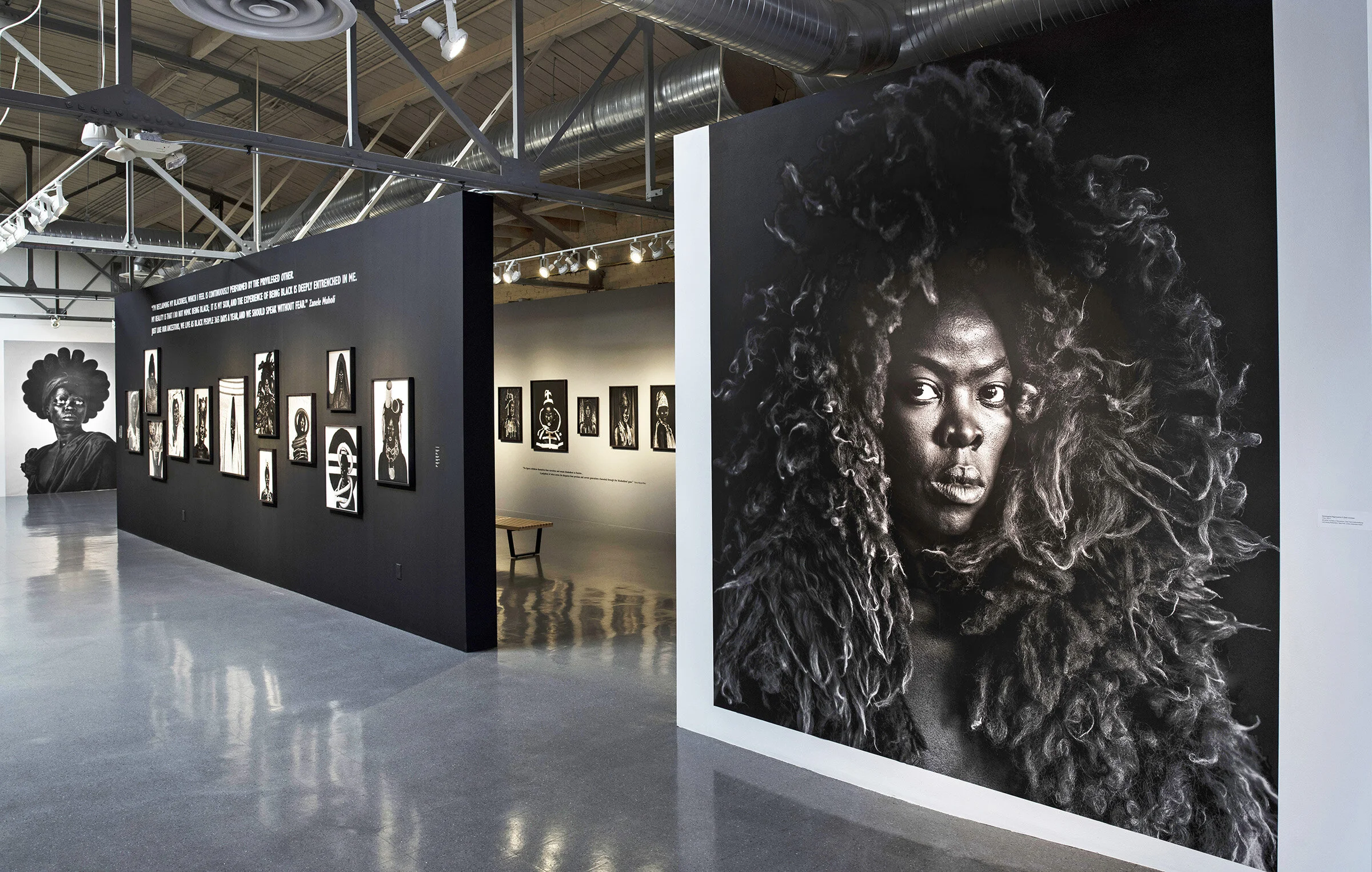Hail the Dark Lioness
Zanele Muholi: Somnyama Ngonyama: Hail the Dark Lioness
Center for Visual Art
965 Santa Fe Drive, Denver, CO 80204
January 8-March 20, 2021
Admission: Free
Review by Danielle Cunningham
Over the last few years, Center for Visual Art has presented several striking lens-based exhibitions, typically centered on the institution’s preferred themes of social justice and activism. This year’s offering is a black and white solo exhibition of photographic self-portraits by self-described visual activist Zanele Muholi (they/them).
An installation view of Zanele Muholi’s exhibition Somnyama Ngonyama: Hail the Dark Lioness at Center for Visual Art. Image by DARIA.
Presented in a range of sizes including floor to ceiling, Muholi’s subjects lock eyes with the viewer, reversing the art historical notion that subjects should mostly avoid the gaze, particularly when the subjects are women or people of color. Black subjects, such as the servant in Manet’s Olympia, have typically been placed in the background, resulting in their near erasure. This is not the case for Muholi’s works, in which the artist transforms themself into different characters placed confidently in the forefront.
Making themself all the more noticeable, Muholi paints their eyelids and mouth with white paint and intensifies the contrast of the photos in post-production so that their skin is several shades darker than it is in real life. These practices combined subvert art history, drawing attention to the relationship between art and systemic racism, and yet they are not the most striking or significant aspects of the exhibition. Rather, it is Muholi’s emphasis on and almost magical metamorphosis of everyday objects that sets the exhibition apart from other similar bodies of work.
Zanele Muholi, Namhla at Cassilhaus, Chapel Hill, North Carolina, 2016, black and white photograph. Image by Danielle Cunningham.
In most of the portraits, Muholi adorns their body with common items, styling them in a manner that renders them nearly unrecognizable in terms of their original purpose. Pieces of rubber become collars, canvas bags become hats, and plastic pens and bits of machines become ornate, futuristic headdresses, all expertly compiled into photographs reminiscent of high fashion. In one especially futuristic work, Namhla at Cassilhaus, Chapel Hill, North Carolina (2016), Muholi uses transformed objects to become a Mad Max character, donning a variety of cyborgian apparatuses over their ears and on top of their head. Their vulnerable body parts protected, this character oozes agency, staring defiantly, and suggesting that they have nothing to hide.
Just as Muholi elevates common items to fine art status, they also elevate their status, alluding to the resourcefulness of marginalized people, many of whom are often expected to—and do—make something out of nothing. Accentuated by transcendent objects, each portrait is disruptive, shredding the perception common to South Africa and elsewhere that queer Black bodies are a perversion. In Muholi’s transformative world, their queer Black body exudes dignity, agency, and multiplicity, reflected in their adoption of decorative objects that seem to span a cross-cultural past, present, and future royal lineage.
Zanele Muholi, Bhekezakhe, Parktown, 2016, black and white photograph. Image by DARIA.
Despite Muholi’s unabashedly queer and Black portraiture, to be Black and queer in South Africa is to constantly confront danger. Muholi points to this situation in works like Bhekezakhe, Parktown (2016), which speaks to the frequency of police brutality in the South African queer community. In it, Muholi is covered in white plastic cable ties, which are arranged atop their head and décolletage so that their face and body are slightly obscured. In the characteristic style of this exhibition, Muholi’s eyes stand out despite also being obscured, and their skin is nearly true black. This artistic tactic certainly enlivens Muholi’s work, but it acts as the artist’s refusal to hide their identity despite threats of physical harm. Further, the cable-ties themselves signify harm from police since, as Muholi notes, they can be used as restraints by police or security guards.
Zanele Muholi’s exhibition Somnyama Ngonyama: Hail the Dark Lioness. Image by Anthony Camera, courtesy of Center for Visual Art.
Clearly, Muholi understands the power of objects—how they can be used to enhance subjectivity, influence perception, and construct environments. By understanding objects, Muholi makes a world of their own without obliterating reality, instead expanding it while uniquely conjoining materials with their body. Plus, Muholi doesn’t simply use overlooked objects, but gives a voice to them, and in doing so, gives voices to overlooked people too.
Alongside Muholi’s exhibition, CVA also presents Deeper Than Skin, a showcase of local emerging artists and curators in its 965 Project Gallery. In a range of media, the artists portray the Black American community’s experience, including recent police violence and activism. Jasmine Wynter’s colored pencil drawings are standouts among the group for the artist’s skilled use of the medium, which almost looks like oil paint, as well as her provocative content.
Danielle Cunningham is a mentally ill artist, scholar, and independent curator living in Denver, CO. Influenced by mysticism and science fiction/fantasy imagery, she creates art that re-contextualizes science fiction tropes and subverts mainstream ideas of gender, sexuality, and (dis)ability. Her practice lies in DIY/punk and Marxist feminist methodologies, because of which she typically pursues collaborations. As a member of Hexus, an intersectional, (dis)abled feminist collective, Danielle has curated exhibitions and created performances and installations using Magick to make visible and de-stigmatize mental illness. Since 2018, Danielle has studied Art History and Museum Studies at the University of Denver.











